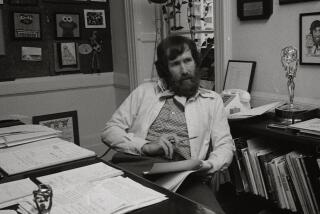String theories
- Share via
“WHENEVER someone endows an inanimate object with life force and casts it in a scenario, a puppet is born.”
So says Eileen Blumenthal, a Rutgers University theater arts professor, whose new book, “Puppetry: A World History,” explores the multifaceted world of “constructed actors” -- puppets -- whose roots go back to Cro-Magnon times.
“What knocked me out,” Blumenthal says, “was how many different kinds of things puppets had been called upon to do in society after society.”
Throughout the centuries and around the globe, puppets have been political subversives, satirists, storytellers and slapstick artists.
They’ve served as religious symbols, fertility models and amulets and as receptacles for spirits to inhabit the world of the living. Onstage, they can endure any torture, defy gravity and rise from the dead over and over again.
Puppetry’s cross-cultural realities led to Blumenthal’s “unorthodox” thematic approach. After a historic overview, “Puppets” is divided into such sections as “High-Wire Acts,” “Puppet Masters,” “Sex,” “And Violence,” “Politics” and “Living on the Edges.”
The lavishly illustrated book contains 350 historical and contemporary images, chosen from “a half a million that I looked at,” Blumenthal says. Among them are an 18th century Chinese “walking” puppet theater; Muppet creator Jim Henson -- “one of the great artists of our time”; Polish director Tadeusz Kantor’s Holocaust-grim theater piece, “The Dead Class”; an elaborate Turkish Karagoz shadow theater djinn; and “the earliest known picture of puppetry in medieval Europe,” from a 12th century manuscript cautioning against “ungodly pastimes.”
“Some of the most popular actors on the planet have been puppets,” Blumenthal says. “Certainly no actor has had the longevity of Punch -- there are versions of him all over the world.
“They break all the rules, they are total sociopaths, they chop their neighbors’ heads off. They have no redeeming qualities, and they’ve been popular for centuries.”
-- Lynne Heffley
More to Read
Sign up for our Book Club newsletter
Get the latest news, events and more from the Los Angeles Times Book Club, and help us get L.A. reading and talking.
You may occasionally receive promotional content from the Los Angeles Times.










